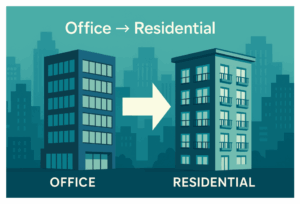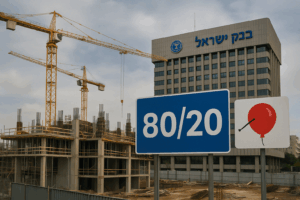The Ripple Effects of War: Tracing the Impact on Israel’s Real Estate Market
Welcome to our in-depth exploration of a unique aspect of Israel’s history and economy. In this blog, we delve into the intriguing correlation between major military conflicts and the fluctuations in the real estate market in Israel. Our journey spans several decades, from the pivotal Six-Day War in 1967 to the significant events of the early 21st century, including the Second Lebanon War in 2006. This analysis is not just a chronicle of historical events; it’s a revelation of how geopolitical turmoil intertwines with economic vitality, specifically in the realm of property values and real estate trends.
The state of Israel, known for its rich history and strategic geopolitical position, has witnessed a series of major wars and conflicts that have shaped not only its borders but also its economy. The real estate market, often a reflection of a nation’s economic health, has shown remarkable resilience and dynamism in the face of these challenges. Understanding the impact of these wars on property prices offers a unique perspective on Israel’s economic and social evolution.
Our analysis aims to provide a comprehensive understanding of this phenomenon, offering insights for investors, homeowners, and history enthusiasts alike. By examining key conflicts like the Six-Day War, Yom Kippur War, Lebanon Wars, and others, we will uncover the patterns and trends that have defined the Israeli real estate market over the years. Join us as we unravel the complexities of how warfare has paradoxically been a catalyst for growth and transformation in Israel’s real estate sector.
The Echoes of Conflict: Israel’s History Shaped by Wars
Israel’s story is in many ways a narrative shaped by conflict and resilience. Since its establishment in 1948, Israel has faced numerous challenges and existential threats, marked by a series of significant wars that have had profound effects on its society, economy, and indeed, its real estate market. This section offers a brief overview of these conflicts, setting the stage for a deeper analysis of their impact on property values and market trends in subsequent sections.
The Six-Day War of 1967, a pivotal event in Israeli history, marked a dramatic shift in the region’s geopolitical landscape. Israel’s victory not only expanded its territory but also reshaped its international standing. This war, along with the Yom Kippur War of 1973, the Lebanon Wars of 1982-1985 and 2006, and the Gulf War of 1992, each brought unique challenges and transformations to the nation.
These conflicts were not just military engagements; they were events that triggered economic shifts, social upheavals, and significant changes in the global perception of Israel. The aftermath of each war presented new realities for Israel’s citizens, impacting everything from national security to economic policies, and crucially, the dynamics of the real estate market.
Understanding this historical context is essential for comprehending the nuanced ways in which wars have influenced Israel’s real estate sector. Each conflict left its mark, shaping the nation’s policies, people’s lives, and the very land on which they live and build.
The Six-Day War: A Turning Point in Israel’s Real Estate
The Six-Day War in 1967 stands as a critical juncture in Israel’s history, not only geopolitically but also economically. The immediate aftermath of the war saw a significant boost in the nation’s confidence, reflected starkly in its real estate market. Before the war, Israel grappled with its deepest recession since its founding in 1948. The victory in the war brought with it a wave of optimism and investment.
In 1968, the year following the war, Israel’s economy witnessed an impressive growth of 14 percent. This economic upsurge was mirrored in the real estate sector, where increased confidence led to heightened activity and rising property values. From 1967 to 2015, the Israeli national income saw a twelvefold increase, and the population nearly tripled. This economic expansion greatly influenced the real estate market, driving demand and prices upward.
However, this growth was not without its challenges. The expansion of Israel’s military industries and higher defense spending impacted the economy. Social spending also saw a significant increase, particularly in housing, welfare, and education, in response to the needs of diverse communities within the nation. These factors combined to create a dynamic and rapidly evolving real estate market in Israel.
The Six-Day War, therefore, marked not just a military victory but a turning point in Israel’s economic trajectory, with the real estate market as one of its most visible barometers.
The Yom Kippur War’s Echo on the Real Estate Market
The Yom Kippur War of 1973 was a moment of significant turmoil for Israel, leading to a halt in the rapid economic growth initiated by the Six-Day War. The conflict brought substantial budgetary pressures, fueled in part by the construction of settlements and increased military spending. These economic strains were reflected in the real estate market
Despite the initial setback, the period after the Yom Kippur War saw a remarkable rebound in the economy and the real estate sector. The market demonstrated resilience, adapting to the new economic conditions and recovering from the war’s immediate impacts. This recovery was indicative of the inherent strength and flexibility of Israel’s real estate market, even in times of geopolitical uncertainty
The war’s aftermath also saw significant policy shifts and economic adjustments, which played a crucial role in shaping the real estate trends in the following years. The resilience of the market in the face of such adversity highlights the unique nature of Israel’s economy and its real estate sector.
The Lebanon Wars: Varied Impacts on Israel’s Property Market
The Lebanon Wars, occurring in two distinct periods (1982-1985 and 2006), had unique and contrasting effects on Israel’s real estate market. The first Lebanon War, spanning from 1982 to 1985, saw Israel’s real estate market maintain stability during the conflict, with property values holding steady. This resilience was a testament to the market’s robustness in the face of geopolitical tensions.
Following the conclusion of the first Lebanon War, the market experienced a significant upturn. Property values increased by approximately 28% within a year of the war’s end, followed by an additional 16% increase in the subsequent year. This growth was indicative of the pent-up demand and the return of investor confidence post-conflict.
However, the Second Lebanon War in 2006 presented a different scenario. In the year following this conflict, there was a slight dip in property prices, approximately 1.5%. But this decline was short-lived, as the market rebounded with a 10% increase in the following year. The quick recovery after the initial drop highlighted the market’s ability to swiftly adapt and bounce back from short-term disturbances.
The Gulf War’s Influence on Israel’s Real Estate Dynamics
The Gulf War in 1992 marked another critical point for Israel’s real estate market. The war’s onset brought uncertainty, but the market demonstrated remarkable resilience. In the year following the Gulf War, the Israeli real estate market experienced a significant surge, with property prices jumping by over 30%.
This increase can be attributed to several factors, including a restored sense of security post-war and the government’s economic policies that encouraged investment in the real estate sector. The period following the Gulf War was marked by a general economic upswing, and the real estate market was one of the primary beneficiaries of this positive trend.
The war’s impact went beyond mere numbers; it reshaped investor perspectives and market dynamics. The resilience and growth of the real estate market in the wake of the Gulf War underscored the sector’s vital role in Israel’s overall economic framework.
Deciphering Patterns: Israel’s Real Estate Market Through Wars
Reflecting on the series of conflicts Israel has faced, a pattern emerges in the real estate market’s response to these tumultuous times. While each war had its unique implications, some common trends are evident. In most cases, the initial impact of conflict was a period of uncertainty and stagnation in property values. However, following the cessation of hostilities, the real estate market consistently showed signs of robust growth and recovery.
This trend can be attributed to several factors, including increased investor confidence, government initiatives to stimulate the economy, and the inherent resilience of the Israeli real estate sector. The market’s ability to bounce back and even grow in the aftermath of conflict highlights its dynamic nature and its crucial role in the nation’s economic stability.
Graphs and charts included in this section illustrate the price movements and trends over the years, providing a visual representation of the market’s fluctuation in response to each major conflict.
Expert Insights: Predicting the Future of Israel’s Real Estate
Seeking to understand the future trajectory of Israel’s real estate market, we turn to experts in economics and property investment. Interviews with these professionals reveal a consensus that the market is likely to continue its pattern of resilience and growth, albeit with the acknowledgment of potential geopolitical uncertainties.
Economists highlight the importance of government policies in fostering a stable investment environment, while real estate professionals emphasize the market’s adaptability and innovation. Predictions for the future include a continued upward trend in property values, driven by ongoing demand and the development of new real estate technologies and practices.
These insights offer valuable perspectives for investors, homeowners, and policymakers, as they navigate the complex interplay of geopolitics and economics in Israel’s real estate market.
War and Real Estate: A Story of Resilience and Growth
In conclusion, our exploration of Israel’s real estate market in the context of its war history reveals a narrative of resilience and growth. Despite the challenges posed by various conflicts, the market has demonstrated an impressive ability to recover and expand. This resilience is a testament to the strength of Israel’s economy and the adaptability of its real estate sector.
For investors and homeowners, these findings underscore the importance of understanding the broader geopolitical context when making real estate decisions. Israel’s history teaches us that even in times of uncertainty, opportunities for growth and prosperity can emerge.
As we look to the future, the lessons learned from Israel’s past will continue to guide and inform the real estate market’s trajectory, shaping the nation’s economic landscape for years to come.




